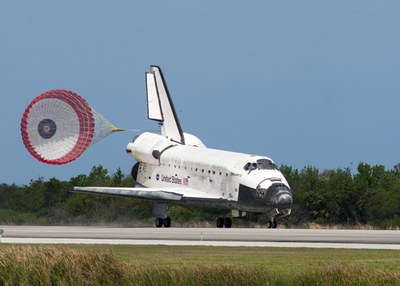Space shuttles and the wisdom of the crowdby Ben Brockert
|
| The question I wanted to answer with the wisdom of a crowd was where the space shuttles would go after decommissioning. |
In The Wisdom of Crowds, James Surowiecki opens with an anecdote of Francis Galton trying to demonstrate that normal people’s opinions were worthless, that “the stupidity and wrong-headedness of many men and women being so great as to be scarcely credible.”
Eight hundred people paid sixpence ($3 in 2011 dollars) to guess the weight of an ox after it had been slaughtered and dressed, with the possibility of winning prizes for being closest. Many were butchers and farmers who should have a good estimate, but many were non-experts with no particular insight.
Galton got the guesses after the competition and was hoping to show that the average voter was a dolt. Yet when all of the guesses were averaged together, the average was closest to the actual number and beat all of the individual experts.
Surowiecki goes on to highlight the requirements for crowd knowledge to be wise:
- Diversity of opinion: Each person should have a different insight into the question.
- Independence: Each person’s opinion should be independent of the others.
- Decentralization: The people shouldn’t all be the same and in the same situation.
- Aggregation: There has to be some mechanism for collecting the individual opinions into a collective.
The question I wanted to answer with the wisdom of a crowd was where the space shuttles would go after decommissioning. To encourage accurate responses I offered a piece of space shuttle tile as a prize for someone who guessed correctly. For diversity and decentralization I just asked the Internet, a seemingly unlimited source of both. For independence, all replies were private, and the order of the possible answers was shuffled for each respondent so that my bias in ordering them would not influence the responses. For aggregation I used an online poll, with each entrant picking four locations from the following list. I simply added the number of votes per location and divided by the number of total responses (73), yielding the following data:
| Smithsonian National Air and Space Museum, Udvar-Hazy Center in Chantilly, Virginia | 89.04% |
| Kennedy Space Center Visitor Complex in Florida | 86.30% |
| Johnson Space Center in Houston, Texas | 73.97% |
| The Museum of Flight in Seattle, Washington | 38.36% |
| National Museum of the United States Air Force in Dayton, Ohio | 28.77% |
| U.S. Space and Rocket Center in Huntsville, Alabama | 26.03% |
| California Science Center in Los Angeles, California | 17.81% |
| Intrepid Sea, Air and Space Museum in New York, New York | 9.59% |
| Adler Planetarium in Chicago, Illinois | 9.59% |
| Evergreen Aviation & Space Museum in McMinnville, Oregon | 9.59% |
| March Field Air Museum in Riverside, California | 8.22% |
| Tulsa Air and Space Museum & Planetarium in Tulsa, Oklahoma | 2.74% |
| Brazos Valley Museum of Natural History in Bryan, Texas | 0% |
The percentages could be interpreted as the likelihood that the location will get a space shuttle. I included the near-guaranteed Smithsonian in the voting to get a baseline number.
The results reflect the general feeling that it is the fourth space shuttle whose location is least defined. The Museum of Flight is ahead of the museums in Dayton and Huntsville, but not by a huge margin. The Intrepid museum in New York, one of the most vocal locations, has a very low probability of receiving a shuttle.
NASA Administrator Charles Bolden is expected to announce the locations of the shuttles on April 12th, the 30th anniversary of the first shuttle launch. After the announcement we’ll see how wise this crowd was.
